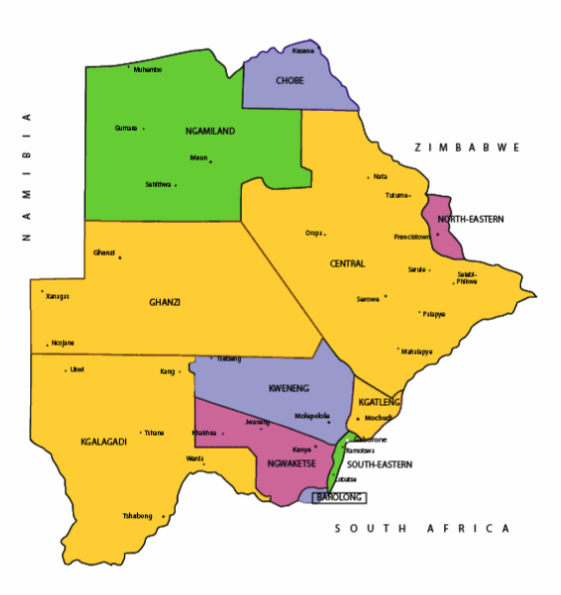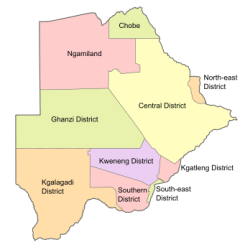Places and their polling stations in Mahalapye East, Botswana
178 Makwate-Taupye
0895 Shakwe Kgotla
0896 Shakwe Primary School
0897 Shakwe Health Post (Tent)
0898 Taupye Kgotla
0899 Mmuabui Primary School
0900 Makwate Kgotla
0901 Makwate Community Hall (Tent)
0902 Paars Halt (Tent)
179 Boseja-Flowertown
0903 Day Star Primary School
0904 Flowertown Primary School
0905 Boseja Kgotla
0906 Bhc Office (Tent)
0907 Railways Football Stadium (Tent)
0908 Diphalana School
180 Xhosa 1
0909 Xhosa 1 Primary School
0910 Xhosa 1 Kgotla
0911 Lutheran Church (Tent)
0912 Mokubatse Primary School
0913 VDC Pre-School (Tent)
0914 Eloyi Christian Church (Tent)
0915 Agriculture Office
181 Kudumatse-Mokoswane
0916 Kudumatse Kgotla
0917 Kudumatse Primary School
0918 Kudumatse Clinic (Tent)
0919 Dikgatlo JSS
0920 Mokoswane Kgotla
0921 Gasetsile Kgotla
0922 Mokoswane Community Hall
182 Mmaphashalala-Pallaroad
0923 Pallaroad Kgotla
0924 Pallaroad Primary School
0925 Dovedale Primary School
0926 Dovedale Kgotla
0927 Mmaphashalala Kgotla
0928 Mmaphashalala Primary School
0929 Phallaroad Community Hall
183 Mookane
0930 Mookane Kgotla
0931 Mookane Primary School
0932 Mookane Clinic (Tent)
0933 Spiritual Healing Church (Tent)
0934 Day Care Centre
Reference: iec.gov.bw/index.php/electoral-districts/polling-stations.html
Botswana
Botswana is a country in Africa. It is topographically flat, with approximately 70 percent of its territory being the Kalahari Desert.
It is bordered by South Africa to the south and southeast, Namibia to the west and north, and Zimbabwe to the northeast.
Capital: Gaborone
Currency: Botswanan Pula
Official language: English
Population: 2.588 million (2021) World Bank
Dialing code: +267
Gross Domestic Product: 17.61 billion USD (2021) World Bank
Botswana’s ten districts are:
- Southern District
- South-East District
- Kweneng District
- Kgatleng District
- Central District
- North-East District
- Ngamiland District
- Kgalagadi District
- Chobe District
- Ghanzi District
Botswana’s councils created from urban or town councils are: Gaborone City, Francistown, Lobatse Town, Selebi-Phikwe Town, Jwaneng Town, Orapa Town and Sowa Township.






The name Botswana refers to ‘Land of the Tswana’. The landlocked, Southern Africa country is officially known as the Republic of Botswana.














Botswana is connected to Zambia through the Kazungula Bridge making it the world’s shortest border between two countries.
A country of slightly over 2 million people (2021), Botswana is one of the most sparsely populated countries in the world. It is essentially the nation state of the Tswana ethnic group, who make up 79% of the population.

About 11.6 per cent of the population lives in the capital and largest city, Gaborone.
Formerly one of the world’s poorest countries—with a GDP per capita of about US$70 per year in the late 1960s—it has since transformed itself into an upper-middle-income country, with one of the world’s fastest-growing economies.


The Tswana ethnic group were descended mainly from Bantu-speaking tribes who migrated southward of Africa to modern Botswana, living in tribal enclaves as farmers and herders.




In 1885, the British colonised the area and declared a protectorate under the name of Bechuanaland.
As colonisation stopped, Bechuanaland became an independent republic under its current name on 30 September 1966.


Since then, it has been a representative republic, with a consistent record of uninterrupted democratic elections and the lowest perceived corruption ranking in Africa since at least 1998.

The economy is dominated by mining and tourism. Botswana has a GDP (purchasing power parity) per capita of about $18,113 as of 2021, one of the highest in subsaharan Africa.


Botswana is the world’s biggest diamond producing country.
Its relatively high gross national income per capita gives the country a high standard of living and the third-highest Human Development Index of continental Sub-Saharan Africa (after Gabon and South Africa).
The country has been adversely affected by the HIV/AIDS epidemic. In 2002, Botswana began offering anti-retroviral drugs (ARVs) to help combat the epidemic.
Botswana is a member of the Southern African Customs Union, the Southern African Development Community, the Commonwealth of Nations, and the United Nations.
